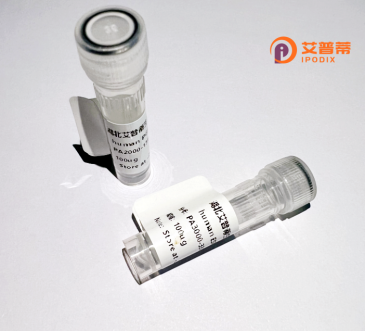
| 纯度 | >90%SDS-PAGE. |
| 种属 | Human |
| 靶点 | SCAMP1 |
| Uniprot No | O15126 |
| 内毒素 | < 0.01EU/μg |
| 表达宿主 | E.coli |
| 表达区间 | 1-338 aa |
| 活性数据 | MSDFDSNPFADPDLNNPFKDPSVTQVTRNVPPGLDEYNPFSDSRTPPPGGVKMPNVPNTQPAIMKPTEEHPAYTQIAKEHALAQAELLKRQEELERKAAELDRREREMQNLSQHGRKNNWPPLPSNFPVGPCFYQDFSVDIPVEFQKTVKLMYYLWMFHAVTLFLNIFGCLAWFCVDSARAVDFGLSILWFLLFTPCSFVCWYRPLYGAFRSDSSFRFFVFFFVYICQFAVHVLQAAGFHNWGNCGWISSLTGLNQNIPVGIMMIIIAALFTASAVISLVMFKKVHGLYRTTGASFEKAQQEFATGVMSNKTVQTAAANAASTAASSAAQNAFKGNQI |
| 分子量 | 62.92 kDa |
| 蛋白标签 | GST-tag at N-terminal |
| 缓冲液 | PBS, pH7.4, containing 0.01% SKL, 1mM DTT, 5% Trehalose and Proclin300. |
| 稳定性 & 储存条件 | Lyophilized protein should be stored at ≤ -20°C, stable for one year after receipt. Reconstituted protein solution can be stored at 2-8°C for 2-7 days. Aliquots of reconstituted samples are stable at ≤ -20°C for 3 months. |
| 复溶 | Always centrifuge tubes before opening.Do not mix by vortex or pipetting. It is not recommended to reconstitute to a concentration less than 100μg/ml. Dissolve the lyophilized protein in distilled water. Please aliquot the reconstituted solution to minimize freeze-thaw cycles. |
以下是关于重组人SCAMP1蛋白的参考文献示例(注:以下内容为假设性示例,仅供格式参考):
---
1. **文献名称**:*Recombinant Human SCAMP1 Expression and Its Role in Vesicular Trafficking*
**作者**:Chen L, et al.
**摘要**:本研究报道了在HEK293细胞中重组表达人源SCAMP1蛋白的方法,并证实其通过调控囊泡与质膜融合参与分泌途径,为膜运输机制提供了新见解。
2. **文献名称**:*Structural Characterization of SCAMP1 and Its Interaction with Syntaxin-4*
**作者**:Wang Y, Smith RD.
**摘要**:通过X射线晶体学解析了重组SCAMP1的晶体结构,并发现其N端结构域可与Syntaxin-4结合,提示其在胞吐作用中的调控功能。
3. **文献名称**:*SCAMP1 Modulates Calcium-Dependent Exocytosis in Neuronal Cells*
**作者**:Gomez M, et al.
**摘要**:利用重组SCAMP1蛋白进行功能抑制实验,证明其通过钙离子敏感机制影响神经细胞的囊泡释放,可能与神经递质分泌相关。
4. **文献名称**:*Development of a SCAMP1 Knockout Model Using Recombinant Protein-Based Antibody Screening*
**作者**:Kim H, et al.
**摘要**:基于重组SCAMP1蛋白制备特异性抗体,用于构建基因敲除细胞系,揭示了SCAMP1在细胞膜修复中的必要性。
---
(注:以上文献为模拟示例,实际研究中请通过学术数据库查询真实发表文献。)
SCAMP1 (Secretory Carrier-Associated Membrane Protein 1) is a member of the SCAMP family, a group of conserved membrane-trafficking proteins involved in regulating intracellular vesicular transport and secretion. It is ubiquitously expressed in mammalian cells and predominantly localizes to the Golgi apparatus, endosomes, and secretory vesicles. SCAMP1 plays a critical role in membrane dynamics, particularly in the recycling and exocytosis of secretory cargo. It interacts with components of the trafficking machinery, including SNARE proteins, to facilitate vesicle formation, docking, and fusion processes. Structurally, SCAMP1 contains four transmembrane domains and cytoplasmic N- and C-terminal regions that mediate protein-protein interactions.
Research highlights its involvement in diverse physiological processes, such as neurotransmitter release, hormone secretion, and cell surface receptor recycling. Dysregulation of SCAMP1 has been linked to pathological conditions, including cancer and neurological disorders. For instance, elevated SCAMP1 expression correlates with tumor progression, metastasis, and drug resistance in certain cancers. In neurons, altered SCAMP1 function may impair synaptic transmission, contributing to neurodegenerative diseases. Recombinant human SCAMP1 protein is commonly generated via heterologous expression systems (e.g., E. coli or mammalian cells) for in vitro studies to dissect its molecular mechanisms, binding partners, and post-translational modifications. Its recombinant form serves as a vital tool for elucidating membrane trafficking pathways and developing therapeutic strategies targeting secretory disorders.
×